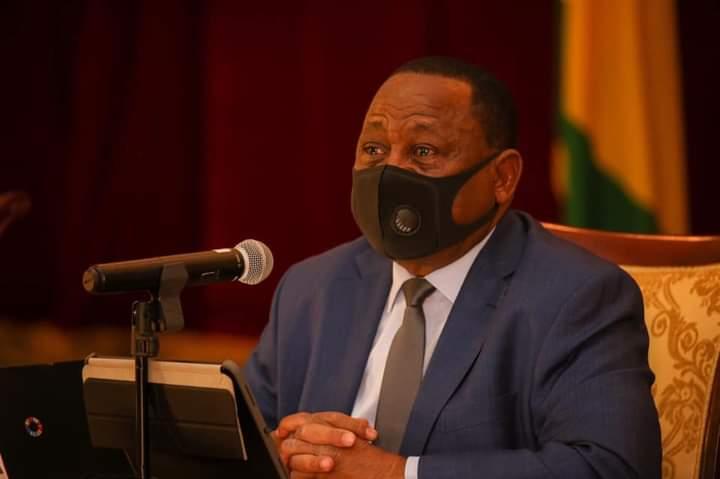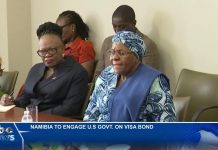Africa-Press – Namibia. NAMIBIA has in the past six weeks seen a downward trajectory in the number of new infections, hospital admissions and deaths due to Covid-19 across all regions in the country.
Children from 12 to 17 years may now with the consent of parents or guardians get the Pfizer vaccine, and Namibians may combine the AstraZeneca and Pfizer vaccines, provided AstraZeneca is taken first.
Up to Friday, no region had reported a Covid-19 death for two days, and bed occupancy for general hospital admissions, high care and intensive care units has declined significantly.
These were some of the announcements made by the Minister of Health and Social Services, Dr Kalumbi Shangula, at the 36th Covid-19 public briefing held on Friday.
Shangula said although the statistics are encouraging, Namibia cannot afford to let its guard down, noting the overall vaccination uptake in the country has declined in the past weeks.
From July to September, the daily uptake stood between 3 500 and 4 000, and over 20 000 per week. This has declined to less than 1 900 per day and just above 10 000 vaccines administered per week.
As on 11 November, a total of 343 482 persons (22.9%) of the eligible population have received the first dose and 279 765 (18.6%) are fully vaccinated.
“This trend must be changed for Namibia to reach the vaccination target by the end of the current financial year. In order to achieve herd immunity, we need to do more,” the minister said.
Regarding vaccination for children aged 12 to 17 years, he said current evidence suggests that children with certain underlying medical conditions are at increased risk of severe illness from SARS-CoV-2 infection.
The Pfizer vaccine is recommended for this age group. Legal informed consent must be obtained from parents or guardians who opt to have their children vaccinated.
Research is ongoing to understand whether Covid-19 vaccines can be safely and effectively mixed and matched. Currently, the WHO recommends it should only be considered in cases of a shortage of vaccines.
In the event of a shortage of vaccines, the WHO recommends the mixing of AstraZeneca and Pfizer. If a person has been vaccinated with the first dose of AstraZeneca, a second dose of Pfizer or Moderna, which is another mRNA vaccine, can be given.
However, the AstraZeneca vaccine cannot be given after vaccination with the Pfizer vaccine if there is a shortage of AstraZeneca. “There are sufficient doses of vaccines in-country, and more are expected to be delivered during November and December,” Shangula said.
As on 11 November, a cumulative total of 129 041 confirmed cases were reported out of the 765 406 samples tested and 125 325 recoveries were reported, a recovery rate of 97.1%.
A total of 163 cases are still active. Since the beginning of the pandemic in Namibia, 3 564 Covid-19 deaths were recorded. From 16 October to 11 November, a total of 36 134 samples were tested and 737 new confirmed cases were reported, giving a positivity rate of 2.0%.
This indicates a decline, compared to the 3.6% positivity ratio reported during the previous dispensation. In addition, 1 478 total recoveries and 26 deaths were reported.
Fifteen deaths occurred at health facilities and ten at home, with one case recorded as dead on arrival. Almost all deaths involved persons who were not vaccinated.
With regards to infrastructure, facilities and services, Shangula said the ministry is capitalising on the breathing space it has as a result of the low caseload to enhance improvements.
Government has completed the purchasing of the 70-bed tented ward located in the Windhoek Central Hospital complex. The donated 40-bed tented ward at the Oshakati Intermediate Hospital has been commissioned.
The contracts for the construction of the 98-bed isolation facility, an extension to the Katutura Hospital TB Ward were signed. The site was handed over to the contractor. Construction work has started and is expected to be completed by early February 2022.
The 12-bed prefabricated isolation facilities for Okahao, Okahandja and Karasburg hospitals were all commissioned. The isolation facilities at Andara and Otjiwarongo are respectively 78% and 82% completed.
The conversion of the Katutura State Hospital nurses hall into a 40-bed ward facility has been done. At the Keetmanshoop State Hospital, the construction of a 15-bed ICU has been completed.
Government has also decided to establish ICUs at formerly less-resourced district hospitals in order to improve service delivery. Steps were taken to upgrade mortuary capacity around the country.
The oxygen generating system for Rundu is nearing completion and the Mariental State Hospital’s oxygen generating system was commissioned. A total of 80 health care workers were trained on matters related to rapid response.
Amended regulations will be in force from 16 November to 15 December. Public gatherings may increase from the current 200 to 500 persons per event. Wearing masks in public places remains mandatory. The sale of alcohol shall be subjected to the conditions of the licenses issued under the Liquor Act of 1998 and the regulations thereof.
All persons wanting to enter Namibia and who were previously infected with Covid-19 but still show positive results with the SARS- CoV-2 PCR test at the point of entry will not be subjected to mandatory quarantine requirements.
This is provided such a person has a valid de-isolation certificate that is not older than three months from the date of discharge and was issued by the health authority in the country of departure.
A negative PCR test result for all other persons remains mandatory. The health minister again urged people to adhere to the rules. “As we are approaching the festive season, and many people will travel to visit their loved ones, I reiterate that we must act responsibly.
“The decision of what you do during this time, if not well considered, may have negative consequences for your and other people’s health and well-being,” the minister said.
“The trajectory of the pandemic in our country in the coming months and years will largely depend on the conduct of the public in terms of whether we comply with the measures and whether more people turn up to get vaccinated.
“These are critical decisions for our country.”
For More News And Analysis About Namibia Follow Africa-Press






